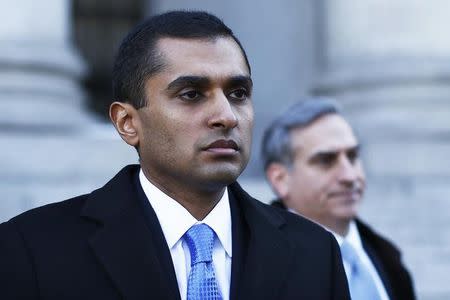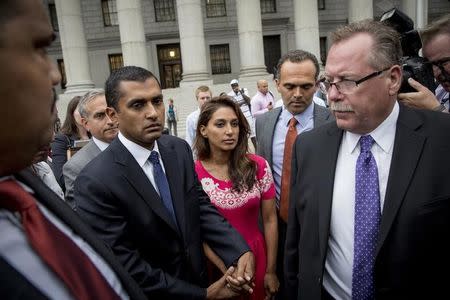SAC's Martoma seeks reversal of U.S. insider trading conviction
By Nate Raymond
NEW YORK (Reuters) - A U.S. appeals court wrestled on Wednesday with whether a recent appellate ruling that limited the scope of insider trading laws meant that the 2014 conviction of former SAC Capital Advisors portfolio manager Mathew Martoma should be reversed.
Martoma's lawyer told the 2nd U.S. Circuit Court of Appeals in New York that under the ruling, a doctor who prosecutors say provided information about a drug trial's outcome could not be found to have done so for an illegal quid pro quo.
"They had a business relationship, but that business relationship was not in exchange for inside information," said Paul Clement, Martoma's lawyer.
But Arlo Devlin-Brown, a prosecutor, said evidence showed Martoma paid the doctor, Sidney Gilman, $70,000 to get the tip, which enabled SAC Capital to make $275 million.
"It is a classic insider trading case," he said.
The arguments followed a 2nd Circuit ruling in December holding that prosecutors must prove an insider received a benefit of "some consequence," and not just friendship, for any tips.
The ruling, which reversed two hedge fund managers' convictions, marked a setback for an insider trading crackdown led by Manhattan U.S. Attorney Preet Bharara that resulted in 96 people being charged since 2009.
Fourteen defendants have escaped charges thanks to the ruling, including Michael Steinberg, another ex-employee of billionaire Steven A. Cohen's SAC Capital hedge fund.
SAC agreed in 2013 to plead guilty to fraud charges and pay $1.8 billion in criminal and civil settlements. It has since rebranded itself Point72 Asset Management as it shifted toward being a family office managing Cohen's fortune.
Martoma, 41, is serving a nine-year prison sentence following his February 2014 trial conviction.
Prosecutors said Martoma in 2008 learned the confidential results of a clinical trial of an Alzheimer's drug being developed by Elan Corp and Wyeth, companies now owned by Perrigo Company Plc and Pfizer Inc, respectively.
That tip came from Gilman, a doctor involved in the trial who Martoma paid $70,000 for expert consulting and who testified Martoma told him he wanted to be friends.
During Wednesday's arguments, Circuit Judge Denny Chin questioned if a re-trial was needed, as jurors were instructed that friendship could constitute an illegal benefit.
But judges also signaled that finding Gilman's financial relationship with Martoma did not constitute a benefit could be going too far.
"Wouldn't your theory have the effect of stymieing virtually all insider trading cases?" Circuit Judge Robert Katzmann asked Clement.
The case is U.S. v. Martoma, 2nd U.S. Circuit Court of Appeals, No. 14-3599.
(Reporting by Nate Raymond in New York; Editing by Tom Brown)



